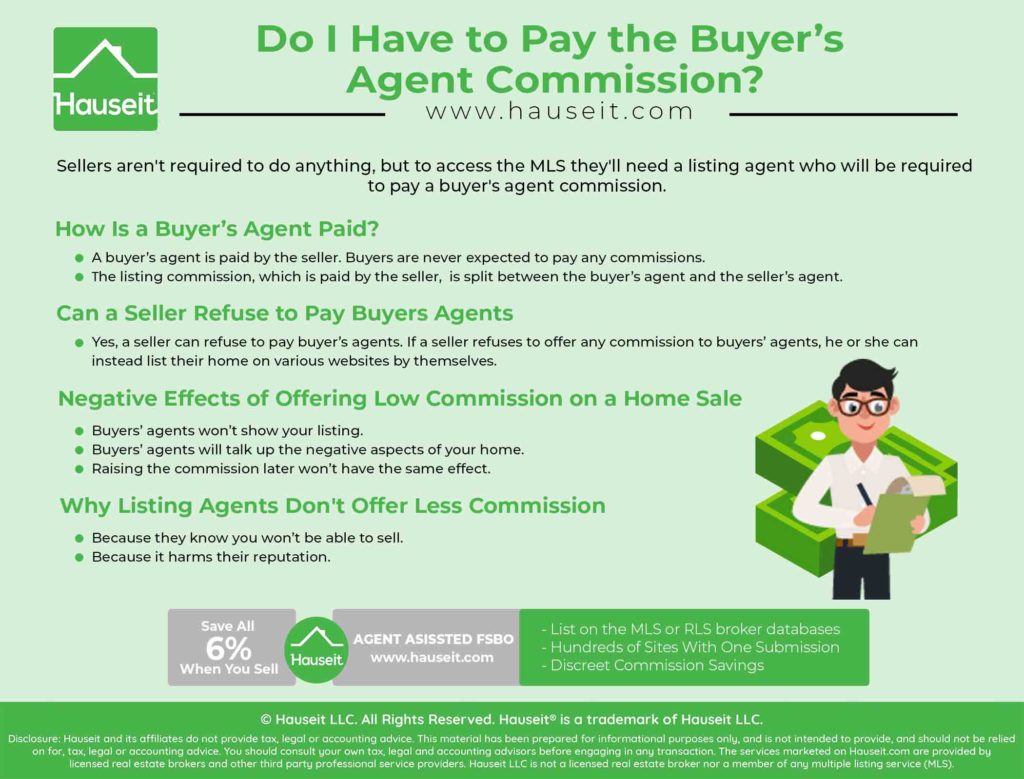No, sellers are not required to do anything, let alone pay commission to a buyer’s agent. However, if sellers wish to list their home in the MLS, then they will need to work with a listing agent who will be required to offer some form of compensation to buy side agents in the MLS.
Sellers may be tempted to offer less than market rate buy side commissions, but this will only hurt their chances of selling as buyers’ agents regularly screen listings based on commission rates.
Furthermore, offering low co-brokes is dangerous for the reputation of listing brokers as the pool of buyers’ agents could associate all future listings by the listing broker as heavily discounted in nature, meaning that the broker’s current and future listings could be subject to boycotting by the wider brokerage community.
Table of Contents
A buyer’s agent is paid by the seller
In the United States, commissions are customarily paid by the seller. The listing agent typically secures a signed exclusive listing agreement with the seller, whereby the seller agrees to pay a fixed percentage in commission if the property sells.
If the listing agent finds a direct buyer, then he or she keeps the entire commission. However, if the buyer is represented by another agent (i.e. a buyer’s agent), then the listing agent splits the commission with the buyer’s agent (i.e. typically 50/50 per MLS association rules).
90% of deals are co-broked, meaning the listing commission paid by the seller is split between the buyer’s agent and the seller’s agent.
Why can’t buyers pay for their own agent?
Buyers don’t pay for their own agent because they’re not expected to. Buyers are consistently told and generally understand that it’s “free” for a buyer to have a buyer’s agent.
Think about it this way, there are 50,000 licensed real estate agents in the NYC metro area alone, constituting perhaps the biggest sales force in New York City. And because 96%+ of all inventory is marketed by traditional listing agents, buyers can’t help but get in touch with agents whether through reaching out directly on a listing or at a party. And guess what, all of these agents will explain to all of these buyers that having a buyer’s agent is completely free for them.
They’ll explain that the listing commission is fixed, and that the seller pays the same rate regardless of whether the buyer chooses to have an agent or not. As a result, they’ll explain that the free service they’re offering is “use it or lose it.” If the buyer chooses to go direct and forgo their right to free buyer agent representation, the listing agent simply collects both sides of the commission in a rare scenario called dual agency.
Our Discretion, Your Advantage
Our traditional partner brokers never openly discount which means less disruption and better execution for you.
Yes, a seller can refuse to pay buyer’s agents. If a seller refuses to offer any commission to buyers’ agents, he or she can instead list their home on various websites by themselves.
This is the traditional way of selling one’s home “by owner.” A seller will buy a For Sale sign and stick it outside their home, take a few amateur photos and post them online on Craigslist, FaceBook, Zillow etc.
Unfortunately, this “old school” method of selling For Sale By Owner doesn’t result in positive outcomes for two primary reasons:
1. For Sale By Owner (FSBO) homes are considered to be off-market because they are not listed in the MLS, meaning their homes will not be visible to the 90% of buyers who are represented by buyers’ agents.
2. FSBO sellers are constantly harassed and solicited by real estate agents looking to poach their next seller client. Agents will go so far as to pretend to have a buyer in order to secure an in-person meeting where they can pitch their services.
MLS rules universally require co-broking, i.e. offering commission to cooperating brokers (i.e. buyer’s brokers). This is the point, after all, of the MLS!
So in short, yes sellers can refuse to pay buyers’ agents. However, listing agents cannot refuse to co-broke, or split their commission with buyer’s agents.
This effectively means that any seller who refuses to pay buyers’ agents will not be able to list their home in the MLS or work with buyers’ agents for that matter.
So yes, sellers are free to not pay buyers’ agents, but they must do it by themselves as a traditional For Sale By Owner seller, which as we’ve discussed means effectively trying to sell your home while it’s off-market.
A Full Service Listing for 1%
Sell your home with a traditional full service listing for just one percent commission.
Buyers’ agents won’t show your listing
Buyers’ agents will steer clients away from your listing if they are searching on behalf of their clients. If they are curating ideas to send to their buyer, why would they choose one that is offering a below market buyer agent fee?
That’s akin to shooting themselves in the foot, regardless of their fiduciary duty to their client. Practically speaking, no one likes to work for free.
Buyers’ agents will talk up the negative aspects of your home
If a listing with a low co-broke accidentally gets sent out to a buyer, whether through a search alert or simply because the buyer’s agent didn’t catch it, the buyer’s agent can always dismiss the home and talk up the negative aspects of the property or even the seller if the buyer asks about it.
Remember, buyers’ agents can pretty much tell their clients anything about your property, even if it’s not true or an outright lie. There’s no way to control for it, and there are certainly plenty of more gray angles where they can paint your home in a negative light.
Raising the commission later won’t help
If you realize your mistake later and try to raise your co-broke down the road, it’ll be too late as the vast majority of buyers’ agents will see it once and forever blacklist or dismiss the listing.
Furthermore, it’ll be very hard to get the word out about your increased commission after your property has already been listed.
Why? Because most automatic search alerts go out when a property is just listed, so most buyers’ agents will check out a property when it just hits the market.
Moreover, while most MLS databases have the ability to sort listings by most recently updated, this sorting mechanism is often limited to price changes or listing status changes (i.e. active, in-contract, sold).
Essentially, there won’t be an easy method in most MLS databases for agents to know that your co-broke rate has changed.
Why Listing Agents Don't Offer Less Commission
Because they know you won’t be able to sell
First and foremost, listing agents refuse to offer less than market rate buyer agent commissions because they know that by doing so, your property will be difficult if not impossible to sell.
Why would they sign on to market and show your property for months if they know that your listing will essentially be boycotted and shunned by the 90% of buyers that are led around by agents?
Believe it or not, what invariably happens when a listing offers a less than market rate commission is buyers’ agents will brazenly dare to put in writing that they can’t work for so little, or that they have a company policy of a specific minimum commission percentage at certain price levels.
Real life examples we’ve seen include:
“Sorry, I can’t work for 1%,” and “you must be joking right, 0.5% or was this a typo?” and “sorry, my firm has a policy against working for less than 2.5%.”

Because it harms their reputation
A listing broker will be loathe to take on a low commission listing where they have to offer a less than reasonable co-broke because it will hurt their reputation and image as a full-commission broker among the pool of buyer’s agents.
If a listing broker puts out enough of these listings offering a pittance of a co-broke, buyers’ agents will soon wizen up and associate all future listings from that broker to be heavily discounted. In fact, even if the listing broker isn’t a discount broker by name, the pool of buyers’ agents will assume for all intents and purposes that the listing broker is a discount broker.
You may fool a buyer’s agent once, but soon the word will spread and the hapless listing agent may get boycotted by a wide swath of the brokerage industry. It’s well known that buyers’ agents can screen and filter out listings from specific firms or agents in the MLS, so what do you think will happen to the listing broker who caused the buyer’s agent to lose money?
This means that going forward, the listing broker will have a harder time selling properties for all of their current and future listings. Now, that sounds like permanent damage that most reasonable brokers would like to avoid doesn’t it?
What Happens If the Seller Refuses to Pay Commission
If a seller refuses to pay commission at all, or to offer a reasonable amount of buyer agent commission in the MLS, then he or she is free to try to sell the property themselves For Sale By Owner.
There is no requirement for the seller to have to pay commission, to list on the MLS or to work with a listing agent. However, a seller does need a listing agent if he or she wants to list a home on the MLS.
So if the seller doesn’t wish to offer something market rate in compensation to buy side agents, the seller is free to try it themselves and post it on Craigslist!
Who decides the amount of commission to offer to buyers’ agents?
Assuming that the local MLS allows a commission split that is anything but exactly equal, the listing agent can typically offer a higher co-broke vs the commission they’d keep for themselves.
In other words, a listing agent can keep just 1% commission as the seller’s agent, but offer say 2.5% or 3% to buyers’ agents in the MLS. This way, the seller would still get full exposure while saving money on commission on the listing broker’s side.
Rules will vary depending on the MLS exchange.
For example, the REBNY RLS requires commissions to be split at least equally in favor of the buyer’s agent. This simply means that the listing agent cannot keep more of the commission for themselves vs what they give to the buyer’s agent.
The Hudson Gateway MLS (HGMLS) on the other hand allows any amount of commission to be co-broked, as long as it’s greater than zero. So in this case, the HGMLS will allow all sorts of commission splitting structures, so long as some amount of commission is being co-broked.
So how is the exact co-broke amount agreed upon?
Assuming flexible commission splits are allowed by the MLS, then it’s a mutual decision between the seller and the listing agent on what to offer to cooperating brokers in the MLS.
Yes it’s true that it’s the seller’s money that is being offered, but keep in mind that it’s the listing broker’s reputation that is on the line, backing the offer of commission.
Disclosure: Commissions are not set by law or any Realtor® association or MLS and are fully negotiable. No representation, guarantee or warranty of any kind is made regarding the completeness or accuracy of information provided. Square footage numbers are only estimates and should be independently verified. No legal, tax, financial or accounting advice provided.






